The Electronic Intifada 2 December 2020
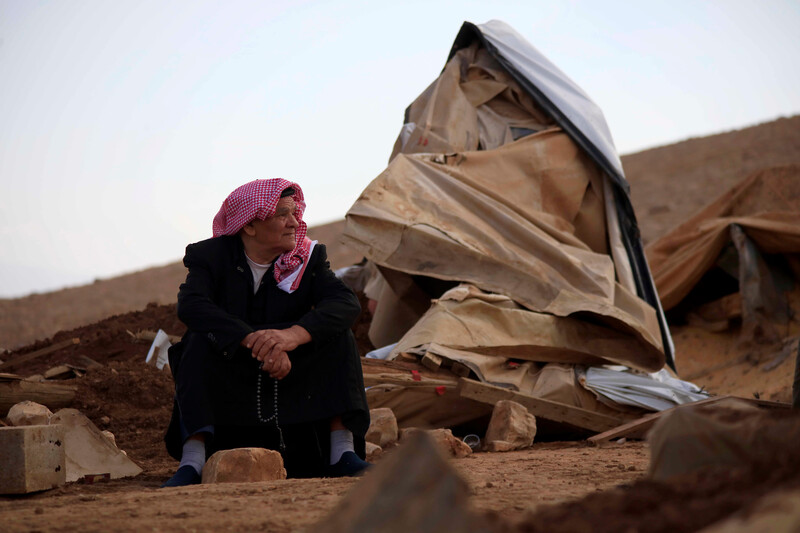
A Palestinian sits in Khirbet Humsa, a Bedouin community east of the West Bank town of Tubas, on 6 November, two days after the Israeli military razed the homes of nearly 80 Palestinians in the village — despite the coronavirus and the onset of winter.
APA imagesIsraeli occupation forces killed two Palestinians at military checkpoints in the West Bank during November.
More than 30 Palestinians have been killed by Israeli forces in the occupied West Bank and Gaza Strip so far in 2020 or died from injuries sustained during previous years.
Soldiers shot and killed Bilal Adnan Rawajba, 29, at Huwwara checkpoint near Nablus on 4 November.
The Israeli army claimed that Rawajba had opened fire on Israeli soldiers “as he drove out of the city.”
The family of Rawajba, who was a legal adviser with the rank of captain in the Palestinian Authority security forces, said he was heading to work when he was killed.
Video of the incident shows an Israeli soldier shooting Rawajba’s car at close range multiple times.
The Palestine Liberation Organization condemned what it called the “extrajudicial execution” of Rawajba. The PLO accused Israel of “preventing ambulance crews from reaching him, leaving him to bleed to death.”
No Israeli soldiers were injured during the incident.
“Clearly posed no risk”
The second Palestinian killed during November, Nour Shqeir, was also shot in his car in what may amount to an extrajudicial execution.
Shqeir, a 36-year-old shuttle driver, accelerated towards Israeli forces at a Jerusalem-area checkpoint on 25 November. Israeli forces had “suspected that Shqeir’s documents did not belong to him,” it has been reported.
Shqeir’s vehicle hit an Israeli Border Police officer, “injuring him lightly,” according to the human rights group B’Tselem. “In response, Border Police officers and security guards at the checkpoint opened fire.”
Footage of the incident shows that Shqeir then “drove on for several hundred meters and stopped by the roadside,” B’Tselem added.
Several Border Police officers and security guards ran towards Shqeir’s car and one of them “fired four shots at him from a few dozen meters away.”
One of the Israeli forces repeatedly shouted “don’t shoot” and “stop” before and after shots were fired.
“Shqeir was shot from afar, while his car was idling … he clearly posed no risk,” B’Tselem stated.
“The police did not claim this was a car-ramming attempt,” B’Tselem added.
Israel withholds the bodies of Palestinians slain during what it claims were attacks on its soldiers, police and civilians. Shqeir’s body was transferred to his family days after his slaying, indicating that the authorities don’t believe he had intended an attack.
Israel is holding the bodies of dozens of Palestinians, including nearly 70 who were killed by Israeli forces or died in its prisons and detention centers since April 2016.
Bilal Adnan Rawajba is among those whose bodies are held by Israel, as is Akram Abu Waar, who died in Israeli detention in November. Imprisoned since 2003, Abu Waar was diagnosed with throat cancer last year and tested positive for COVID-19 in July.
Another prisoner, Maher al-Akhras, was freed by Israel on 26 November. Al-Akhras had suspended a 103-day hunger strike earlier in the month after Israel had agreed to release him when his administrative detention order expired.
Al-Akhras had been held without charge or trial under an administrative detention order following his arrest on 27 July.
COVID surges in Gaza
Meanwhile, cases of COVID-19 surged in the occupied Palestinian territories, particularly in Gaza, during November. Health authorities in the Strip warned that the medical system there was at a breaking point.
The head of UNRWA, the UN agency for Palestine refugees, warned that the agency didn’t have enough funds to pay November salaries to its staff of 28,000.
UNRWA’s 13,000 employees in Gaza “will be the most affected,” according to the UN monitoring group OCHA.
More than 13 years of a tightened economic blockade and closure imposed by Israel and repeated military assaults has left Gaza on the brink of economic collapse.
“Gaza has one of the highest unemployment rates in the world and more than half of its population lives below the poverty line,” as noted in a new report by the UN economic group UNCTAD.
That report estimates that Israeli closures and attacks have cost Gaza’s economy $16.7 billion between 2007-2018.
This estimation reflects only a partial cost of Israel’s occupation, as it doesn’t account for “the economic impact of preventing the Palestinian people from using their natural gas field off the shores of Gaza,” the report adds.
In the West Bank, Israel demolished at least 140 Palestinian-owned structures on the pretext that they were built without a permit during November. These include around 80 structures destroyed in Khirbet Humsa, where 73 people, more than half of them children, were displaced on 3 November.
“With a month left before the end of the year,” B’Tselem stated, “Israel has demolished the homes of more than 900 Palestinians in 2020.”
Israel destroyed the homes of 677 Palestinians in the West Bank, including East Jerusalem, last year.
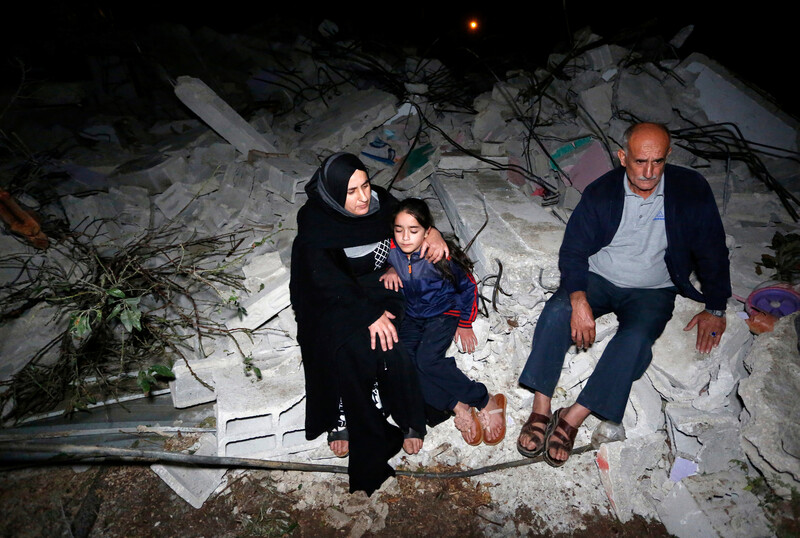
Palestinians sit on the rubble of a house demolished by the Israeli army in the West Bank city of Nablus on 2 November. The military says it demolished a home belonging to the family of Khalil Dweikat, a Palestinian in Israeli custody after allegedly stabbing and killing a rabbi in central Israel in August. Dweikat’s brother told Israeli media that Khalil had severe psychological problems. “We will act to destroy the terrorist’s home and administer the most severe punishment,” Israeli Prime Minister Benjamin Netanyahu vowed after the fatal incident.
APA images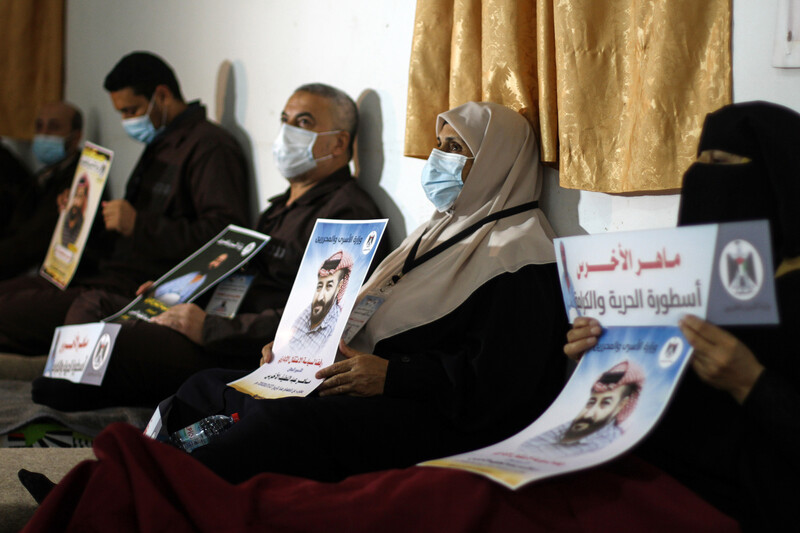
Palestinians in Gaza City take part in a hunger strike in solidarity with Maher al-Akhras, who was on a lengthy hunger strike to protest his detention without charge or trial by Israel, 3 November.
APA images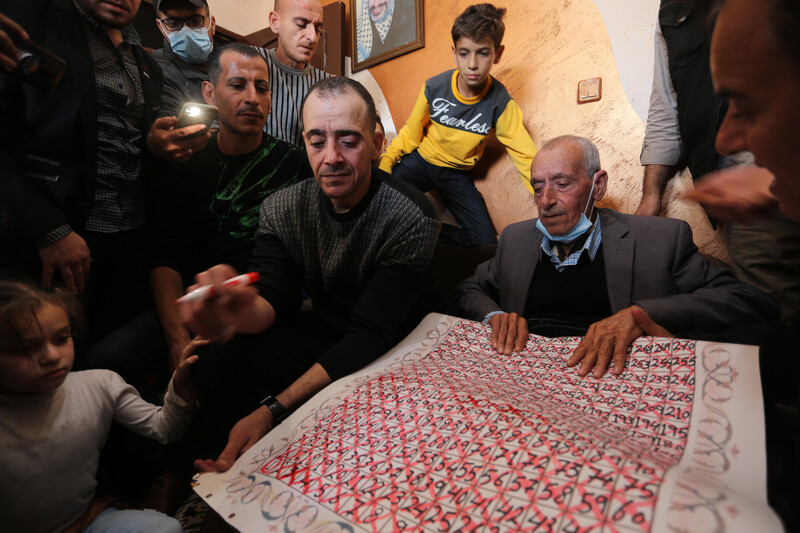
Abd al-Raouf Qedan, newly released after serving a 16-year sentence in Israeli prisons, marks the last day of his imprisonment on a calendar made by his father who was counting down the days until his son’s release, Rafah, southern Gaza Strip, 6 November.
APA images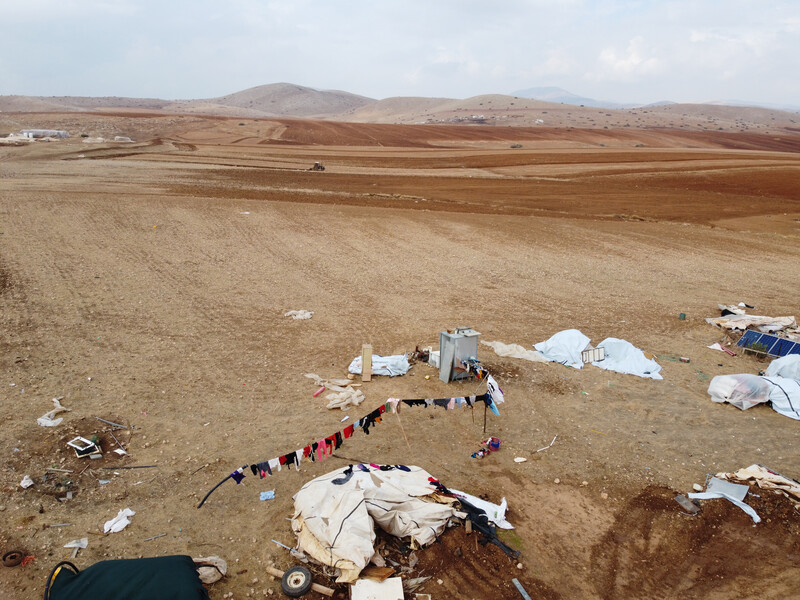
The aftermath in Khirbet Humsa, a Bedouin community in the West Bank’s Jordan Valley, after dozens of structures were razed by Israeli forces days earlier, 6 November.
ActiveStills
Employees of the Gaza City municipality protest to demand payment of their salaries on 8 November.
APA images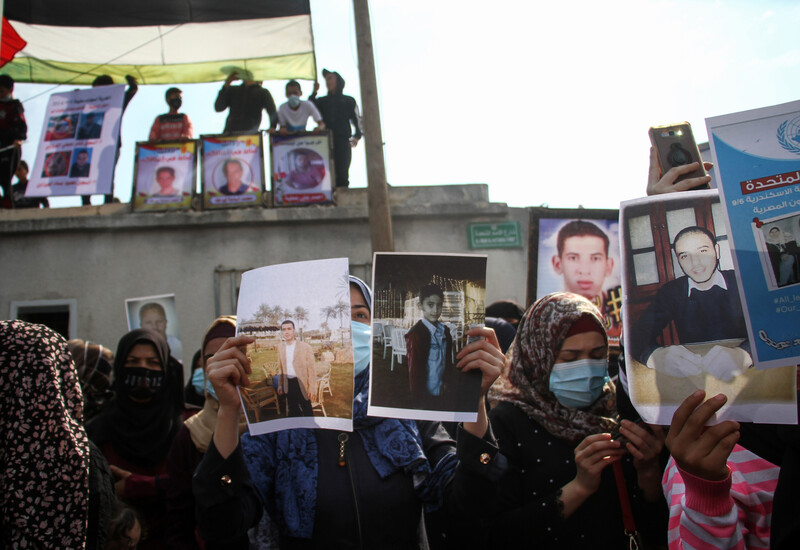
Palestinians hold pictures of their missing relatives during a protest in front of the Gaza City offices of UNSCO on 8 November. On 3 November 2016, some 240 people, among them migrants from Gaza, went missing after two migrant boats capsized off the coast of Libya. Nearly 5,000 people are estimated to have died while trying to cross the Mediterranean Sea that year.
APA images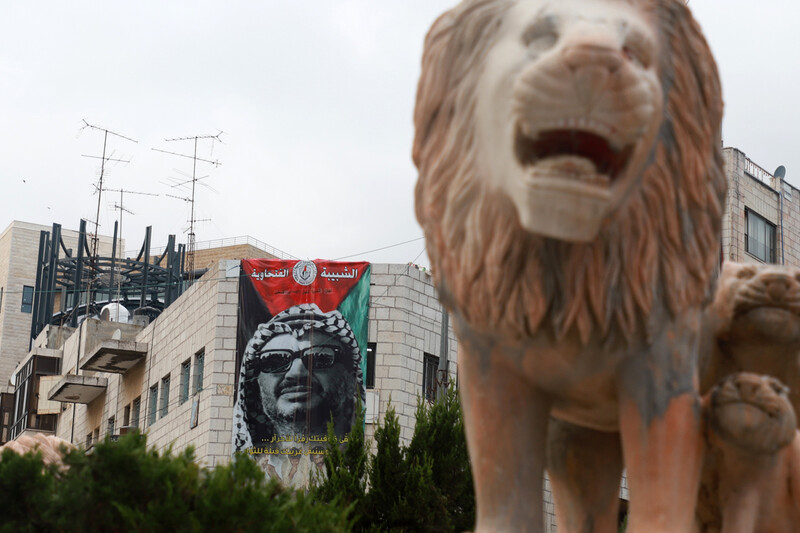
A banner showing Yasser Arafat is displayed during a celebration marking the 16th anniversary of the Palestinian leader’s death in the West Bank city of Ramallah, 11 November.
APA images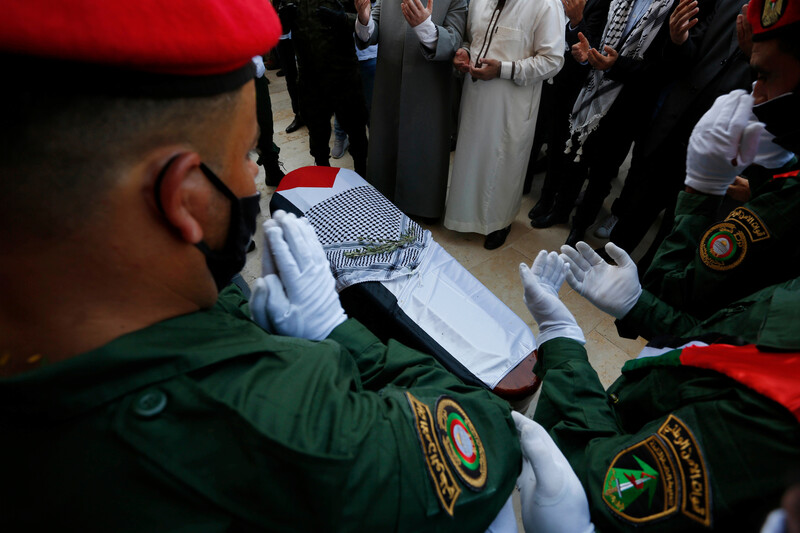
Palestinians mourn during the funeral of Palestinian Authority chief negotiator Saeb Erekat in the West Bank city of Jericho on 11 November. Erekat died one day earlier due to complications from the coronavirus at the age of 65.
APA images
Fighters belonging to the Islamic Jihad faction rally in Gaza City to commemorate the one-year anniversary of Israel’s assassination of its military leader Baha Abu al-Ata, 12 November. Thirty-four Palestinians were killed in the 48 hours of fighting across the Gaza-Israeli boundary following the assassination of Abu al-Ata last year.
ActiveStills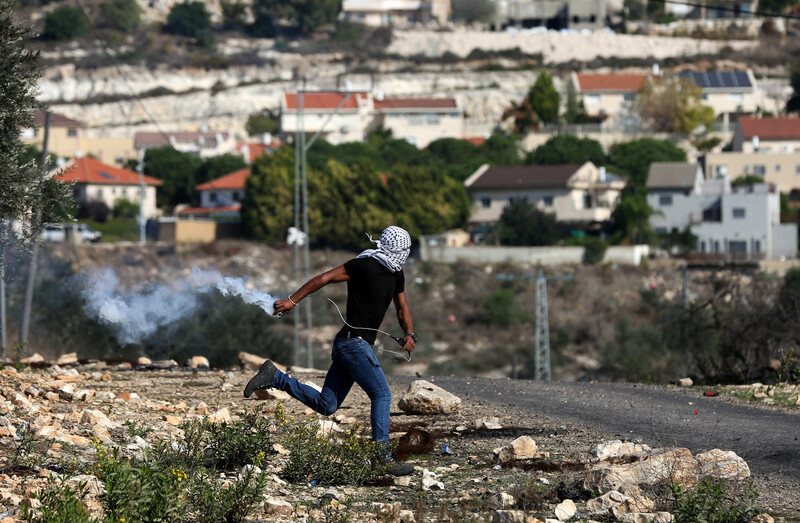
A protester returns a tear gas canister fired by Israeli forces during confrontations following a weekly demonstration against the expropriation of Palestinian land in the village of Kfar Qaddum, near the West Bank city of Nablus, on 13 November.
WAFA
A Palestinian girl plays near a dump in Nahr al-Bared refugee camp, Khan Younis, southern Gaza Strip, 15 November.
APA images
Palestinians mark the first anniversary of the massacre of the al-Sawarka family in Deir al-Balah, central Gaza Strip, 19 November. Eight members of the family — five of them children — were killed when Israel targeted their home in an airstrike. A ninth member of the family died days later.
APA images
Palestinians stand on a major road with flags, disrupting the movement of Israeli settlers, during a protest against a new settlement outpost near Ein Samia, central West Bank, 20 November.
ActiveStills
Israeli occupation forces use tear gas, sponge bullets and stun grenades to disperse around 150 Palestinian and Israeli activists protesting against an illegal settlement outpost near Ein Samia in the central West Bank on 20 November.
ActiveStills
Palestinian girls compete during a boxing tournament in Gaza City on 20 November.
APA images
Palestinians compete in a camel race at the site of the former international airport in Rafah, southern Gaza, 20 November.
APA images
Activists block the entrance to a quarry operated by HeidelbergCement in the occupied West Bank, halting production at the site, 22 November. HeidelbergCement is a German construction giant that operates West Bank stone quarries without Palestinian permission. Most of the quarried products are used by Israel’s construction industry, including for settlements built in violation of international law.
ActiveStills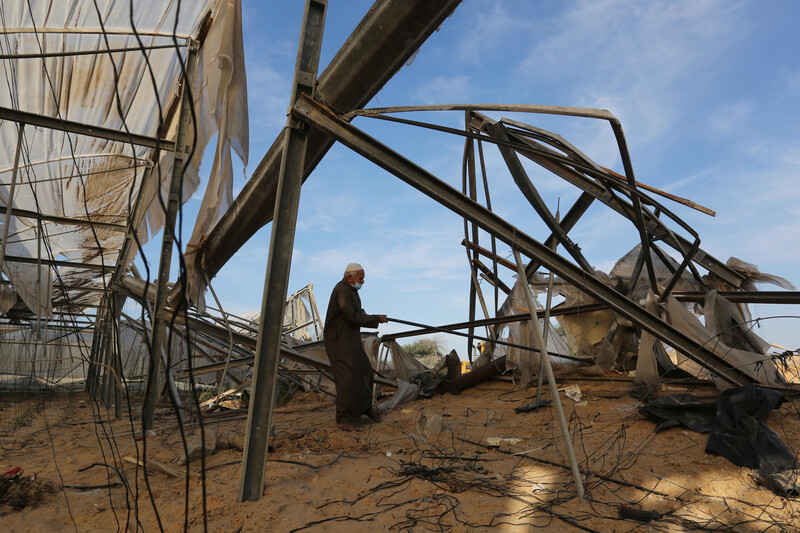
A Palestinian man inspects the damage at the site of an Israeli airstrike in Khan Younis southern Gaza Strip, 22 November. A rocket was fired at Israel from the Gaza Strip the previous evening, the army said, shortly after warning sirens sounded in the southern Israeli city of Ashkelon.
APA images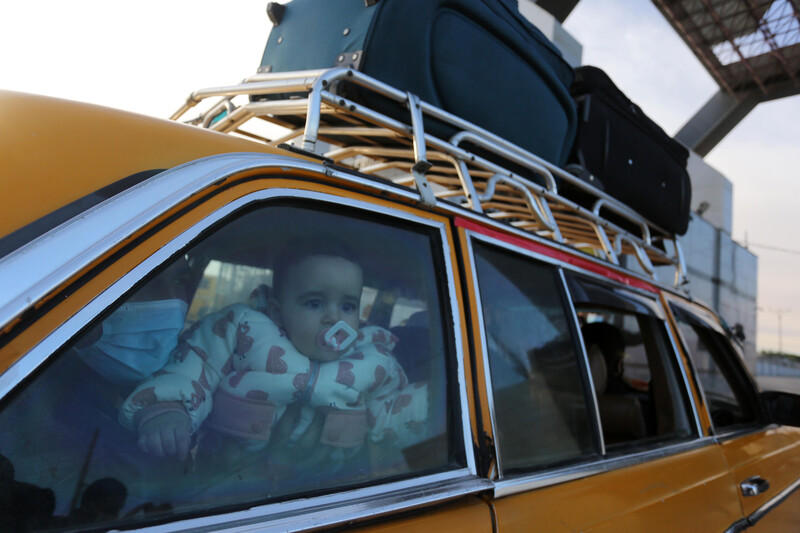
Palestinians wait for permits to travel from Gaza into Egypt via Rafah crossing, partially opened during coronavirus-related restrictions, on 24 November.
APA images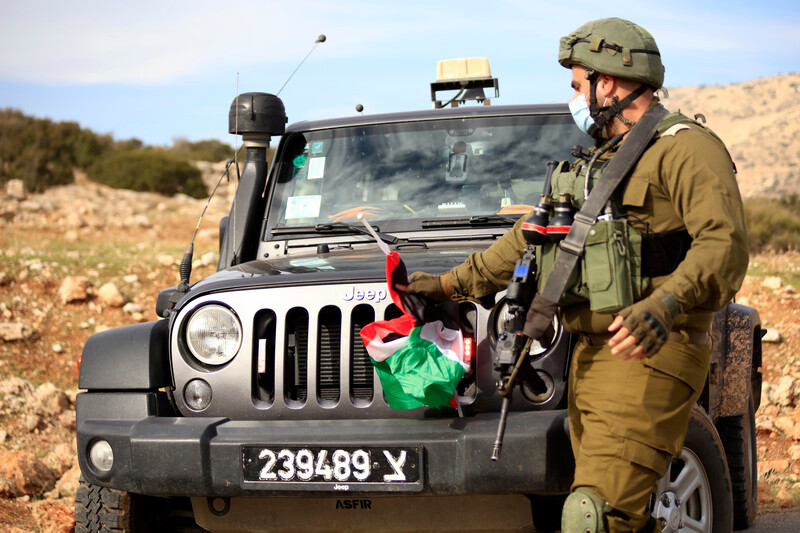
An Israeli soldier removes a Palestinian flag from a military jeep during a protest against settlements in the West Bank’s Jordan Valley on 24 November.
APA images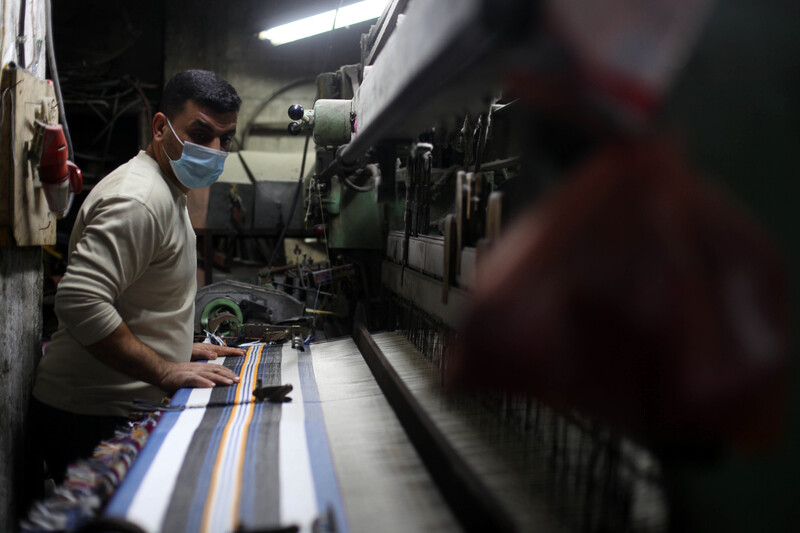
Palestinians weave carpets at a Gaza City workshop on 26 November.
APA images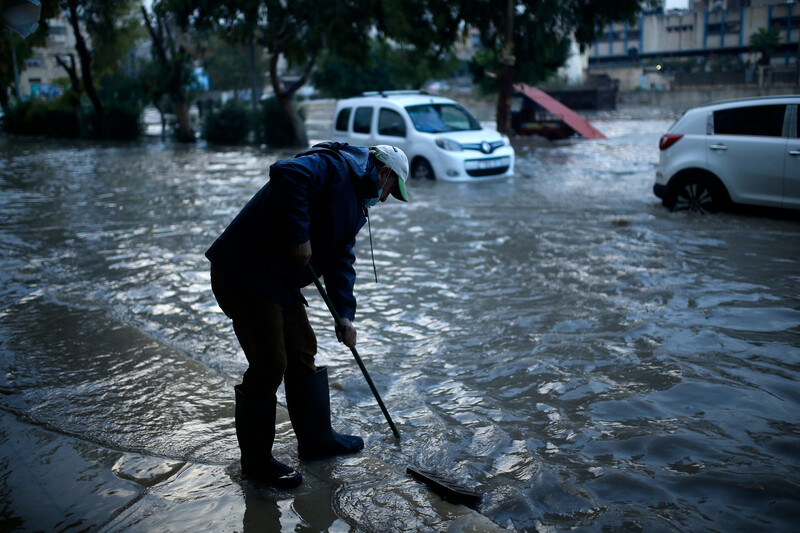
A Palestinian worker tries to unclog a drain on a flooded Gaza City street following heavy rains, 26 November.
APA images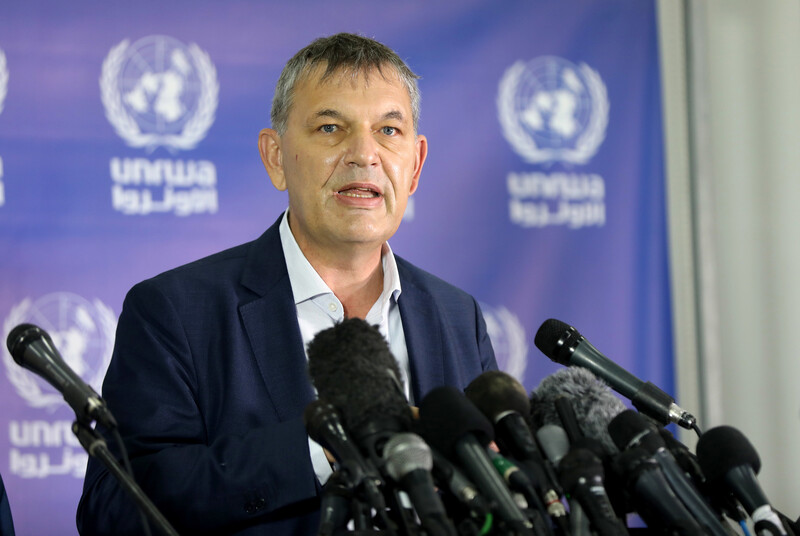
Philippe Lazzarini, the commissioner-general of UNRWA, the UN agency for Palestine refugees, holds a press conference in Gaza City during which he stated the agency lacks funds to pay employees’ November salaries, 26 November.
APA images
Maher al-Akhras is treated at al-Najah hospital in the West Bank city of Nablus after being released from prison following a 103-day hunger strike on 26 November. Al-Akhras had suspended his protest earlier in the month after Israel agreed to release him on the date that his administrative detention order expired. Israel detains Palestinians without charge or trial under indefinitely renewable administrative detention orders issued by military courts.
APA images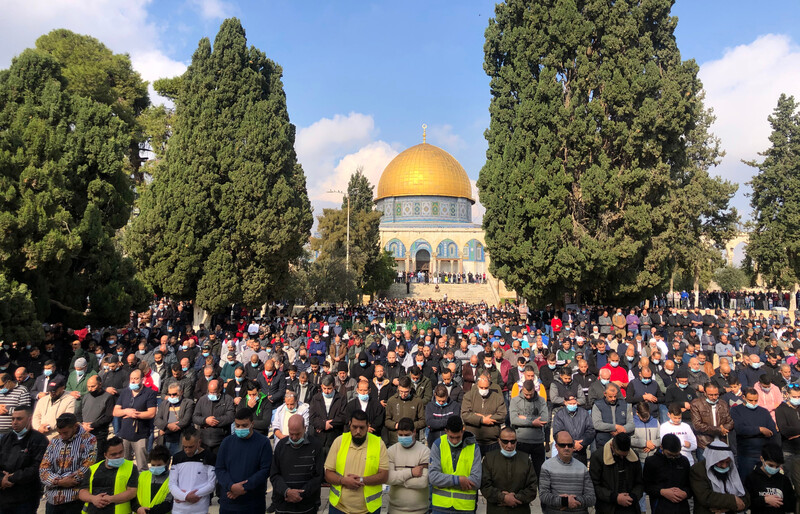
Palestinians perform Friday prayers at the al-Aqsa mosque compound in Jerusalem’s Old City on 27 November.
APA images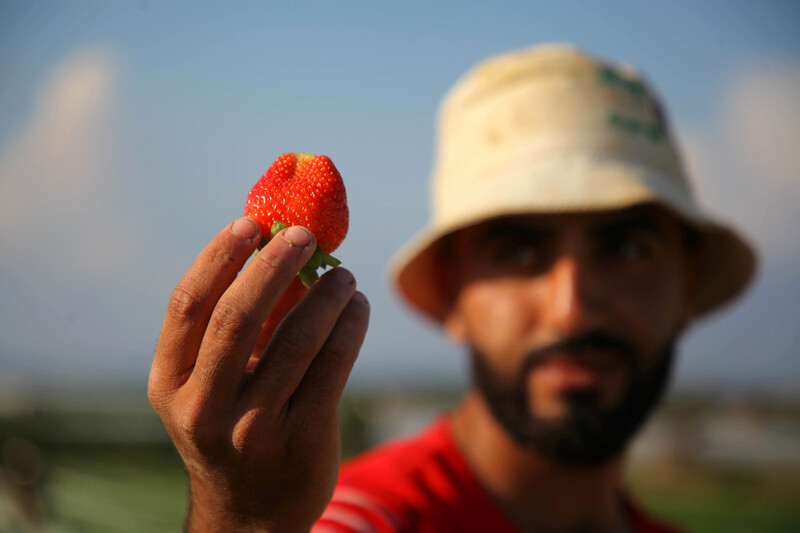
A Palestinian farmer harvests strawberries in Beit Lahia, northern Gaza Strip, 28 November.
APA images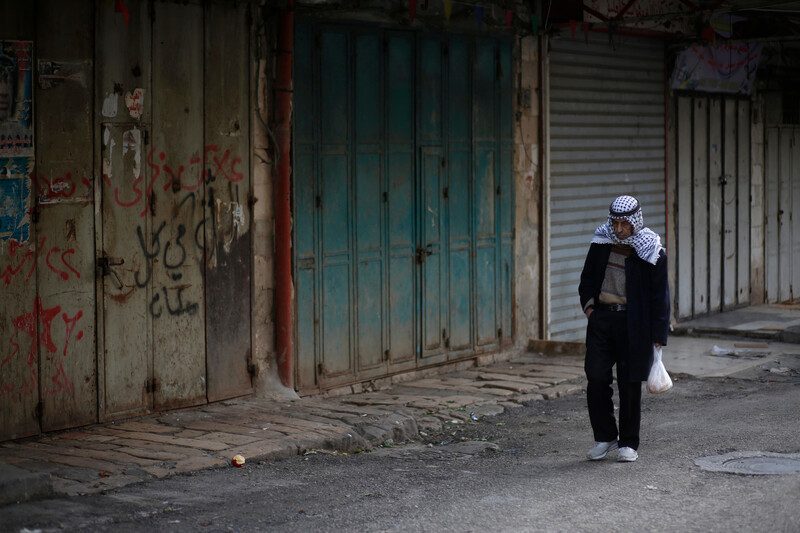
A man walks along a deserted market street as Palestinian authorities have announced a lockdown on weekends to curb the spread of the coronavirus in West Bank city of Nablus, 28 November.
APA images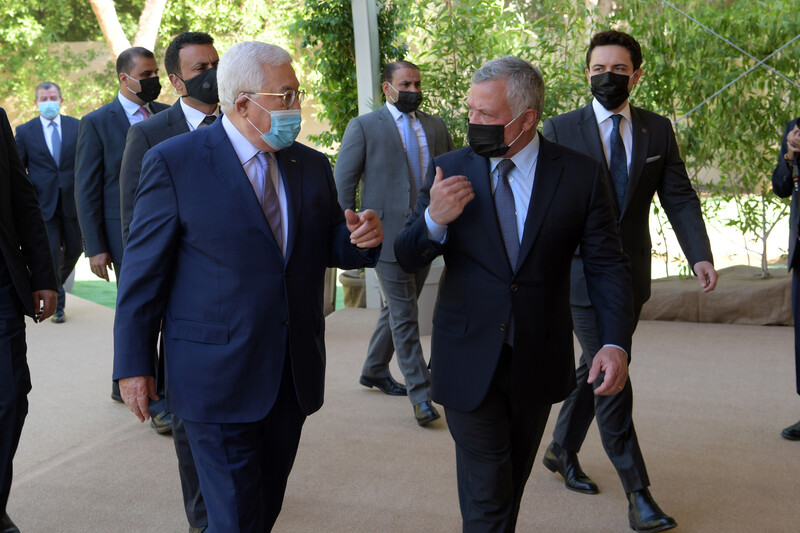
Palestinian Authority leader Mahmoud Abbas meets with Jordanian King Abdullah II in Aqaba, Jordan, on 28 November.
APA images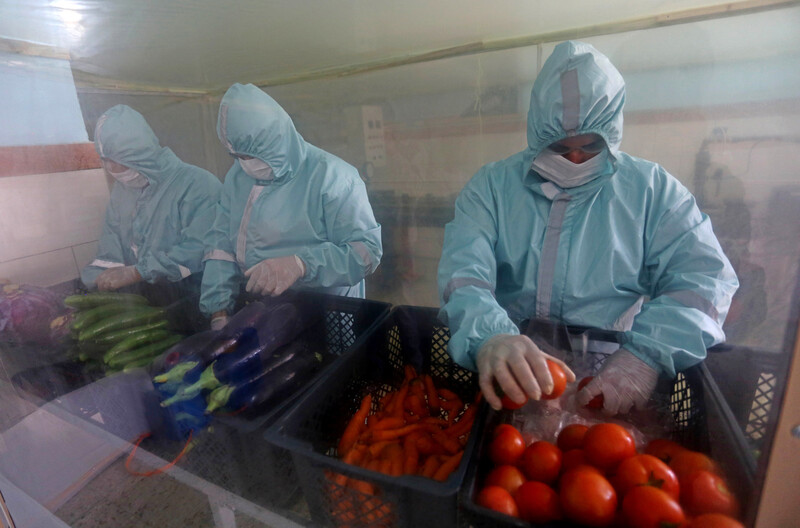
Palestinian workers sterilize vegetables ordered by customers for home delivery amid concerns about the spread of the coronavirus, central Gaza Strip, 30 November.
APA images
Palestinian university students plant peas near the boundary with Israel in eastern Khan Younis, southern Gaza Strip, on 30 November. The students plan to use the money they will make from farming the peas to help with their university fees and to help support their families.
APA images

